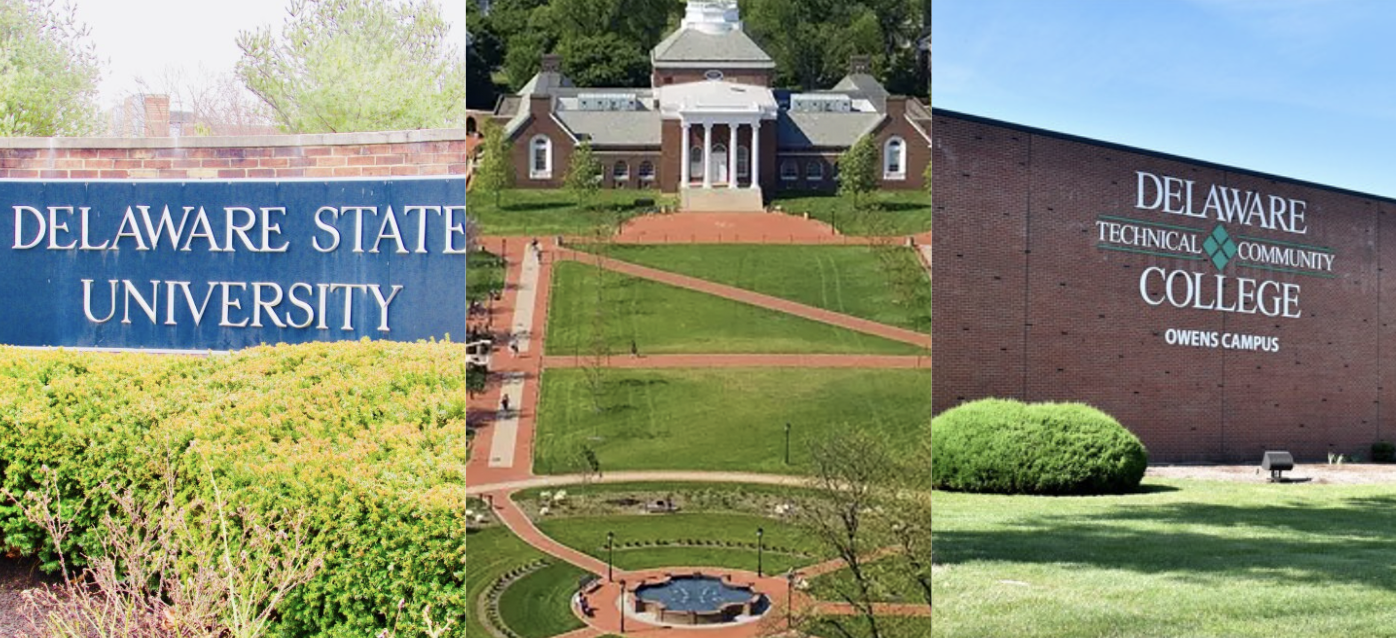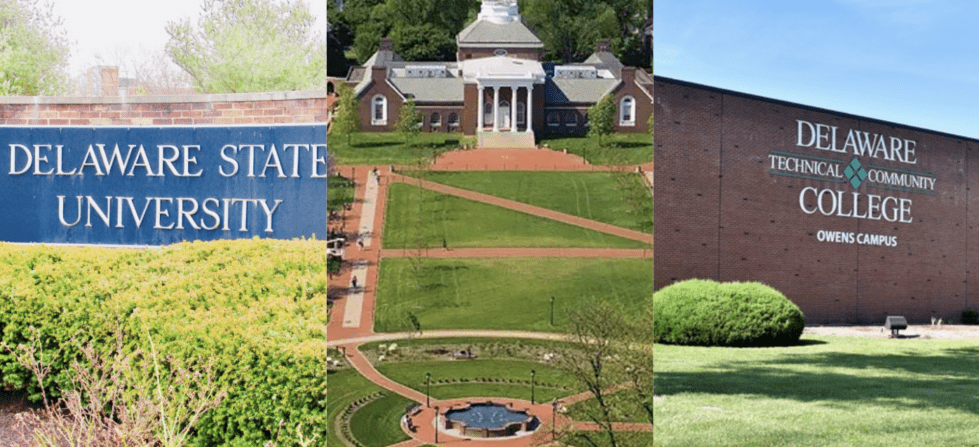
DSU, UD and Del Tech asked for millions in state funding, with a large chunk for deferred maintenance.
The big three institutions of higher education in the First State along with the Delaware Department of Education on Thursday asked for a combined $300 million from the state for capital improvement projects.
As the state’s General Assembly prepares its budget for fiscal year 2025, which starts July 1, the University of Delaware, Delaware State University and Del Tech all appeared before the Joint Capital Improvement Committee.
As always, the leadership from the schools spent the majority of their presentation with information like student demographics, enrollment numbers and graduation rates, new and successful programs and more, before their big asks.
The Department of Education, headed by Secretary of Education Mark Holodick, listed projects going in 19 school districts that involve state funding.
This is a unique year, as six districts have had referendums this school year, four of them successful. Two others will try one more time in the coming months to match grants promised through the certificate of necessity process.
That asks districts to apply for money for capital projects. The state can either accept or deny. If accepted, usually the state pays about 65% of the cost of the projects with the district on the hook for the other 35%.
Referendums usually involve tax hikes, which sometimes escalate over a few years, and the state money comes over a period of about three years.
That means a district like Christina, which had its certificate of necessity approved last school year, is set to receive state funding for next fiscal year to address its projects.
The Department of Education is seeking about $20 million to dish out during next fiscal year to fund approved certificates of necessity.
Gov. John Carney’s recommended budget for fiscal year 2025 includes most of the asks from the four education groups.
It lays out a $2.1 billion total investment for all of public education for next year, about one-third of the state’s total budget.
Here’s the asks:
University of Delaware – Total: $52.5 million
UD President Dennis Assanis requested $30 million for deferred maintenance and lab upgrades, $7.5 million to support the National Institute for Innovation in Manufacturing Biopharmaceuticals (NIIMBL) and $15 million for the Securing American Biomanufacturing Research and Education (SABRE) Center – a 70,000-square-foot facility that broke ground in late April.
RELATED: UD breaks ground on $150M SABRE bio-pharma center
Some of the factors in the budget, Assanis said, are higher costs for personnel – specifically because of health insurance – and higher costs of goods and services.
He also cited challenges in trying to keep tuition affordable for students.
He said prevailing wages are another barrier, but Sen. Jack Walsh, D-Wilmington and chair of the JCI, pushed back on that point.
“I would argue though that the prevailing wage benefits all workers, it is an average rate that is taken in the state of Delaware and all contractors participate,” he said. “That is the average rate that comes out of those surveys that the contractors do and those wages go right into the economy.”
He said the concept of the prevailing wage is all about paying people a fair wage so they can raise their families and also send their children to college.
Assanis pointed out that the new SABRE Center is expected to create about 3,500 new jobs, which the committee applauded.
He also spent time talking about what has become known as the “FAFSA Fiasco” and even said that is a huge point of stress for him, as the delays in federal financial aid have consequently led to delays in the university knowing what its student body will be next year.
He said those numbers were pretty much set at this time last year.
Assanis played a video showing poor conditions in some of the campus’s buildings to help advocate for deferred maintenance projects, and also how some buildings have a very poor layout of bathrooms, with some extremely populated ones having very few.
Committee members also were excited about UD sports move to Conference USA in the fall. They are anticipating more success as well as more business as a result of sporting events, whether that be from local vendors and restaurants or from contracts with major television networks such as ESPN and CBS.
RELATED: UD will pay $6 million to jump to Conference USA in 2025
Delaware State University – Total: $30 million
DSU President Tony Allen asked for $10 million to address deferred maintenance projects, $3 million to renovate its Aviation Hangar, $7 million for athletics transformations like upgrading facilities and $10 million for critical infrastructure upgrades.
In DSU’s February hearing in front of the Joint Finance Committee, Chair Sen. Trey Paradee, D-Dover, said he’d like to see them improve athletic facilities, in part to help attract elite athletes and bolster the school’s sports.
RELATED: JFC praises DSU aviation, says it should upgrade facilities
The highly ranked HBCU was given $500,000 from basketball legend Earvin “Magic” Johnson, for athletic upgrades. He also promised to donate $2 million more if the school builds a new basketball arena, which is in its future plans.
Once again DSU’s aviation program was praised. Its partnership with United Airlines has more than 100 students training to become pilots.
Allen confirmed the school is in talks with other airlines as well, and even the Philadelphia International Airport.
He noted that 71% of DSU’s students are using the state-funded INSPIRE Scholarship to pay their tuition.
“We have a significant number of philanthropic partners that are supporting Delaware State, both on the operation side and the capital side,” Allen said, “but we need your support as an anchor for us.
“You are in fact our largest investors, and if we can show that the state is supportive of the university, that will mean that more corporate partners will also be in support.”
Delaware Technical Community College – Total: $27,010,600
President Mark Brainard is seeking $22,010,600 for critical capital needs/deferred maintenance, $3.5 million for minor capital improvement, $300,000 for technology and $1.2 million for parking garage expansion on Del Tech’s Wilmington campus.
The college was applauded for pathway partnerships it has made in recent years with K-12 schools, including culinary and nursing ones, that allow high school students to earn college credits in their preferred career. They include nursing and teaching, whose graduates are highly sought.
Brainard also ran through recent major projects completed, including a Wilmington East Building, Healthcare Center of Excellence and a Stanton campus B-Wing.
Del Tech also has major projects in progress, a new Terry Building, an additional Allied Health Center of Excellence and a Stanton Child Development Center.
Sen. Nicole Poore, D-Delaware City, said she’s heard from local businesses who would love to partner with Del Tech, and thanked Brainard for forming connections with the community.
Department of Education – Total: $197,138,000
In addition to the money for districts’ certificates of necessity, Holodick asked for everything stated in Carney’s recommended budget: $102,767,000 for ongoing projects, $37,455,000 for 100% state-funded ongoing projects, $9,732,300 for market pressure contingency, $18,300,000 for minor capital improvements, $160,000 for architectural barrier removal and $9,138,000 for safety and security.
Kim Klein, associate secretary for the department, presented a breakdown of each district’s different projects for the approved certificates of necessity this school year.
Committee Chair Rep. Debra Heffernan, D-Bellefonte, thanked Holodick and Klein for their “concise” presentation, which only lasted five minutes.
The final budget for fiscal year 2025 will be presented to the General Assembly in June and must pass both houses before going to Carney for his signature.

Raised in Doylestown, Pennsylvania, Jarek earned a B.A. in journalism and a B.A. in political science from Temple University in 2021. After running CNN’s Michael Smerconish’s YouTube channel, Jarek became a reporter for the Bucks County Herald before joining Delaware LIVE News.
Jarek can be reached by email at [email protected] or by phone at (215) 450-9982. Follow him on Twitter @jarekrutz
Share this Post




